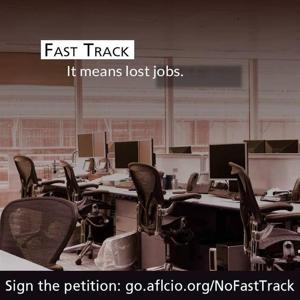8 Things You Need to Know About Trade Deals This Year

A lot of the buzz about the new Republican-controlled Senate is about international trade deals, particularly the Trans-Pacific Partnership (TPP) and so-called Fast Track authority. As we previously discussed, the problems with Fast Track and TPP are plentiful. They aren't good for working families. They cost jobs and increase inequality. Here are eight things you need to know about TPP, Fast Track and other potential trade deals this year:
1. Trade deals are confusing enough, but they're made worse by the alphabet soup of acronyms needed to figure out what's going on. TPP stands for “Trans-Pacific Partnership,” and is a trade and economic policy deal being negotiated in secret between the United States and 11 other countries, including labor and human rights violators such as Vietnam, Brunei and Mexico. Allowing human and labor rights violators into the agreement gives them a free pass (why work any harder to raise standards when they have the access to the U.S. markets they want?) and accelerates the race to the bottom in wages that is already hurting U.S. workers like you and me. The deal also could increase corporate control over our economy and weaken our ability to respond to a recession. The TPP could still be fixed, but none of the negotiators seem interested in challenging its corporate power agenda—and how can working people have a real influence when the actual text of the deal is secret?
2. TTIP, which stands for “Trans-Atlantic Trade and Investment Partnership,” a trade and economic policy deal being negotiated in secret between the United States and the 28 countries of the European Union. Unlike the TPP, the TTIP’s main goal isn’t to send more U.S. jobs overseas and turn them into sweatshop jobs (though some of that could happen). What the TTIP is really about is eliminating “regulatory barriers” to trade. The problem is, one person’s regulatory barrier is another person’s essential standard (whether that means lead in lipstick, or reporting requirements for big banks, or the right of local governments to protect their drinking water supply). So the TTIP still poses risks if it’s not negotiated correctly.
3. TISA, which stands for “Trade in Services Agreement,” a trade and economic policy deal being negotiated in secret between the United States and 49 other countries. The biggest risk of the TISA is that it hands over essential public services to the private sector—who will squeeze out every last dime of profit from the taxpayers while degrading services and turning decent jobs into minimum wage, no benefit, dead-end jobs.
4. The deals are being negotiated in secret with important people who will be affected by the deal, most notably working families, not represented in the negotiations. (While some labor unions do get to “advise” the president on trade policy, business advisers outnumber labor advisers by about 15 to 1. And we do not get to participate in the negotiations or see the negotiating texts.)
5. If Fast Track is approved, Congress must vote on the TPP within 90 days of the date the president submits it to Congress, which means that there will be little time to read the agreement to find out what's even in it.
6. Fast Track would limit the ability of anyone to fix the agreement to make it better. The vote will be all or nothing with no chance to add amendments. Meanwhile, supporters will try to round up votes by predicting dire consequences if the deal doesn't pass.
7. Fast Track will also prevent senators who oppose a trade deal to filibuster it.
8. But the most important thing you should know about trade in 2015 is that the story isn’t written yet. The battle for jobs is not over, and you can make a difference. Most of the mainstream media isn’t reporting much (if anything) on the TPP, TTIP, TISA or Fast Track. And they certainly aren’t highlighting the risks. So you have to speak up. Be the voice of the news for the people who don’t know the risks. Call your member of Congress and sign the petition here to stop Fast Track in its tracks.
***
This has been reposted from the AFL-CIO.

